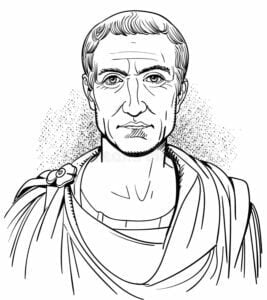
Why did Shakespeare write this famous line?
Well, first of all Shakespeare wrote it in Latin, which translates to “Even you, Brutus?” which isn’t so dramatic as “et tu Brutus”, so it was obviously written for effect. In the play, Caesar utters these words as he is being stabbed to death, having recognized his friend, Brutus, as being among the assassins.
How did it come to this?
Well, he was assassinated by a group of several senators. We know this as records show that he was stabbed 23 times! Of course, Brutus wasn’t the only one, but theatrical licence allows Shakespeare to change it ever so slightly.
It appears that there were a group of around 60 senators, they got together because they didn’t like the amount of power that Caesar was concentrating on himself. Basically, their argument was that he was undermining the Roman Republic, it was to this group that Brutus joined.
Who was Brutus?
Well, Brutus’s story is an interesting one.
He was a Roman politician, an orator who was close to Caesar. However, as Caesar found ways to evade accountability in the courts of law, Brutus turned and started opposing him. This led to Brutus siding with Pompey, who was fighting Caesar during a civil war (49–45 BC). Caesar finally defeated Pompey at the Battle of Pharsalus where Brutus surrendered to Caesar, who granted him amnesty. Then Brutus went back to supporting Caesar, for a while…
What happened then?
Brutus then became dissatisfied, again, as Caesar didn’t change, in fact, he became even more monarchical and despotic, which inevitably led several senators to plan his end.
In those days politics were different. When they met to plan his end, it wasn’t to make him retire from office, oh, no, it was to plot to assassinate him. Brutus then joined this group, and it appears that he ended up taking a major role.
 Julius Caesar
Julius Caesar
He was an amazing man, he transformed Rome from a republic to an empire, while grabbing power through ambitious political reforms. Julius Caesar probably went down in history not for his military and political successes, but for his steamy relationship with Cleopatra. Have you noticed in history there is always a woman!
However:
- He was not a lovable character, but then few dictators are.
- His soldiers followed him because he was a winner, but they didn’t love him.
- His generosity to defeated opponents, however magnanimous it was, did not win their affection.
Yet, though not lovable, Caesar was indeed fascinating. His political achievements required skill, almost genius, in such things as administration and military skill, as well as in what we now call PR.
The end
As with all brutal dictators, in the end they are overthrown, and the interesting thing is that those who finish them off, always seem to be those closest to them. When they turn on the brutal dictators it is always death. I have a theory they never see this coming because no one dares to tell them they are wrong!
This is exactly what happened to Caesar and Shakespeare brought this lesson to us with those famous words “et tu, Brutus”.
Isn’t history Fun
10 questions to discuss:
- According to the blog, why did Shakespeare choose to write Caesar’s final words in Latin?
- How many senators were involved in Caesar’s assassination according to the blog?
- Why did Brutus initially oppose Caesar, then join him, and then oppose him again?
- What evidence does the blog present to support its claim that Caesar wasn’t a lovable character?
- What does the blog mean by “PR” in the context of Caesar’s achievements?
- Why does the blog say that those who overthrow dictators are often those closest to them?
- Do you think the blog presents a fair and balanced view of Julius Caesar?
- Can you think of any other historical figures who were betrayed by people they trusted?
- What is the significance of the phrase “et tu, Brute” in the context of the play and in broader culture?
- Do you think Shakespeare’s portrayal of Caesar and Brutus is still relevant today? Why or why not?
For more information on Caesar look at:
https://www.history.com/news/julius-caesar-assassination-fall-roman-republic
https://www.historyhit.com/how-did-the-assassination-of-julius-caesar-unfold/
https://www.magellantv.com/articles/who-killed-julius-caesar-why-was-he-betrayed
© Tony Dalton


 Julius Caesar
Julius Caesar